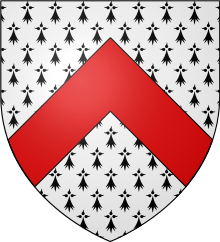James Tuchet, 7th Baron Audley
The Baron Audley | |
|---|---|
 Arms of Tuchet: Ermine, a chevron gules | |
| Personal details | |
| Born | James Tuchet c. 1463 |
| Died | 28 June 1497 (aged 33–34) Tower of London, England |
| Cause of death | Beheaded |
| Resting place | Blackfriars, London, England |
| Spouses | Margaret Darrell (m. 1483)Joan Bourchier (m. 1488) |
| Children |
|
| Parents |
|
James Tuchet, 7th Baron Audley (c. 1463 – 28 June 1497) was a British nobleman and the only lord to fully join the
Birth, succession, marriages, and issue
Tuchet was born in
About 1483 he married Margaret Darrell, the daughter of Richard Darrell of Littlecote, Wiltshire by Margaret Beaufort, Countess of Stafford, widow of Humphrey Stafford, styled Earl of Stafford, and daughter and coheir of Edmund Beaufort, 2nd Duke of Somerset, by whom he had a son and heir, John Tuchet, 8th Baron Audley (c. 1483 – 20 January 1557/8).[3][4]
Audley married secondly, about Michaelmas 1488, Joan Bourchier (died 3 March 1532), daughter of Fulk Bourchier, 10th Baron FitzWarin, and Elizabeth Dynham.[5][6]
Roots of disaffection
James Tuchet's father, John, the 6th Baron Audley, had joined the
Audley was summoned to attend sessions of Parliament from 1492.
Cornish rebellion of 1497
The rebel army from Cornwall was led by a blacksmith, Michael Joseph (known as An Gof), and a lawyer, Thomas Flamank. Audley met it when it reached Wells in Somerset. It seems Audley had already been in correspondence with An Gof and Flamank.[19][20] Now, as a nobleman with military experience, he was acclaimed by the rebels as their commander.[21] His exact qualities in this role are unclear but it was to turn out that he failed to provide a sound strategy or create a unified sense of purpose, and militarily he led the army only to defeat.
The force approached London via
Audley was captured on the battlefield. Like An Gof and Flamank he was imprisoned in the
Audley's lands were confiscated, later to be returned to his son John in 1533.[27] The manor of Honybere was granted for life to Sir John Arundell, for the latter's service against the rebels.[28] The Audley title was forfeit but was restored to John Tuchet in 1512.[29]
Notes
- ^ "James Tuchet". Peerage (The). Retrieved 4 January 2020.
- ^ Cokayne 1910, p. 342
- ^ "James Tuchet". Peerage (The). Retrieved 4 January 2020.
- ^ Cokayne 1910, p. 342
- ^ Burke 1831, p. 73; Cokayne 1910, p. 342; Arthurson 2004.
- ^ Foster and Lee state that Joan Bourchier was Audley's first wife; however the online ODNB states that she was his second.
- ^ Archbold 1899, pp. 76–7
- ^ Archbold 1899, pp. 7
- ^ Pugh 1992, pp. 55
- ^ Archbold 1899, p. 77
- ^ Archbold 1899, p. 77
- ^ Archbold 1899, p. 77
- ^ Arthurson 1987, p. 10
- ^ Arthurson 1987, pp. 3–5
- ^ Collins 1709, p. 350
- ^ Arthurson 1987, p. 4
- ^ Bacon 1996, p. 55
- ^ Rowse 1969, p. 123
- ^ Rowse 1969, p. 123
- ^ Bacon 1996, p. 149
- ^ Rowse 1969, p. 123
- ^ Rowse 1969, pp. 125–126
- ^ "BBC History Magazine, June 2020, p12, Anniversaries, Dominic Sandbrook".
{{cite magazine}}: Cite magazine requires|magazine=(help) - ^ Collins 1709, p. 350
- ^ Rowse 1969, p. 127
- ^ Archbold 1899
- ^ Collins 1709, p. 350
- ^ Rowse 1969, p. 127
- ^ Cokayne 1910, p. 342
References
- Archbold, William Arthur Jobson (1899). . In Lee, Sidney (ed.). Dictionary of National Biography. Vol. 57. London: Smith, Elder & Co. pp. 76–7.
- Arthurson, Ian (1987). "Chapter 1: The Rising of 1497: A Revolt of the Peasantry?". In Rosenthal, Joel; Richmond, Colin (eds.). People, Politics and Community in the Later Middle Ages. Alan Sutton Publishing Limited. pp. 1–18. ISBN 0-312-01220-9. Retrieved 30 May 2020.
- Arthurson, Ian (2004). "Tuchet, James, seventh Baron Audley (c.1463–1497)". doi:10.1093/ref:odnb/27576. (Subscription or UK public library membershiprequired.)
- ISBN 0-8014-3067-4.
- Burke, John (1831). A General and Heraldic Dictionary of the Peerages of England, Ireland and Scotland, Extinct, Dormant and in Abeyance. London: Henry Colburn and Richard Bentley. p. 73. Retrieved 5 April 2013.
- Cokayne, George Edward (1910). The Complete Peerage, edited by Vicary Gibbs. Vol. I. London: St Catherine Press. pp. 341–2.
- Collins, Arthur (1709). The Peerage of England. printed by G.J. for Abel Roper and Arthur Collins.
- Foster, Joseph (1886). The Royal Lineage of Our Noble and Gentle Families. London. p. 88. Retrieved 5 April 2013.
{{cite book}}: CS1 maint: location missing publisher (link) - Pugh, T.B. (1992). "Chapter 1: Henry VII and the English Nobility". In Bernard, T.W. (ed.). The Tudor Nobility. Manchester University Press. pp. 49–110. ISBN 0-7190-3625-9.
- Rowse, A.L. (1969). Tudor Cornwall: Portrait of a Society. Macmillan.
External links
- Sir James Tuchet, 7th Lord Audley, thepeerage.com Retrieved 5 April 2013
